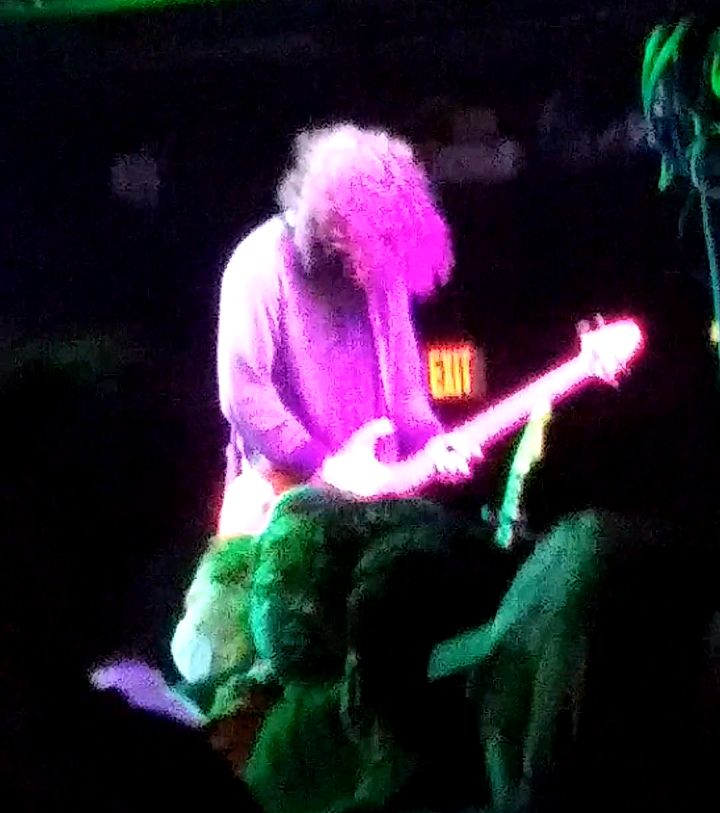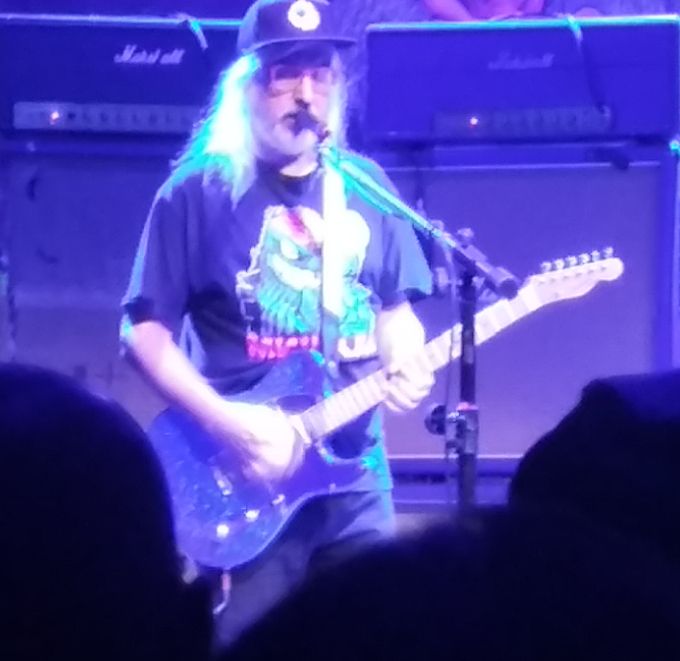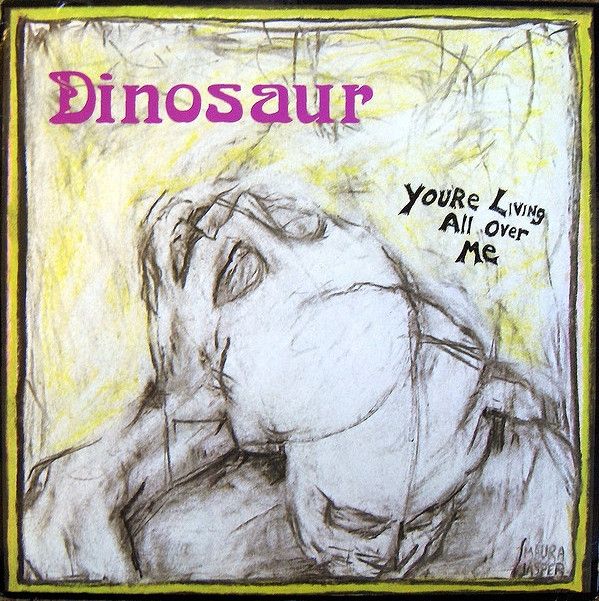Beauty in the Noise: A Delve into Dinosaur Jr.
by James Paci, Form VI
6 min. read — March 24, 2022
Dinosaur Jr is one of the most influential alternative rock bands of all time. Their musical DNA can be found in countless bands, from indie performers like Built To Spill to grunge acts like Nirvana. Characterized by their thunderous, ridiculously loud sound and chaotic, yet beautiful guitar solos, Dinosaur Jr is also one of the most unique bands out there, merging influences from hardcore punk, thrash metal, and country into a distinct and surprisingly cohesive sound, with their dirty guitars and drawled singing seminal in the formation of grunge. However, their sound wasn’t always cohesive, and it has evolved over time.
Dinosaur Jr was originally formed from the remnants of the Massachusetts hardcore punk band Deep Wound. In 1984, former Deep Wound members J Mascis (formerly drummer, now lead guitarist), Lou Barlow (formerly guitarist, now bassist), and Charlie Nakajima (vocals) formed the group Mogo with Patrick Murphy, known professionally as Murph, on drums. After just one performance, though, Mascis removed Nakajima, having Lou and himself pick up vocals. They renamed themselves Dinosaur and released their self-titled debut album Dinosaur in 1985.
On Dinosaur, the band set themselves apart from hardcore, but retained some of its style, namely its sheer volume and raw, rough production quality. Unlike hardcore’s simple power chords and absence of guitar solos and guitar effects, Mascis plays rich chords and intricate solos, making use of phasers, flangers, and other guitar effects taboo in hardcore. Barlow’s aggressive bass playing complements the music, providing a solid and fleshed-out backup for Mascis’ guitar wizardry. Standouts on the album include “Forget The Swan,” “Repulsion,” and the balls-to-the-wall “Mountain Man.” Although Mascis and Barlow split singing duties on the album, Mascis’ drawled vocal style makes it easy to tell who’s singing in which song. The bridge of “Does It Float” sounds like the intro to a Metallica song, and “Cats In A Bowl” definitely shows the band’s country and folk influences. Unfortunately, the album fails to integrate many of its influences in a consistent manner. The whiplash from going from quiet, folksy songs to hardcore and thrash inspired songs is jarring to say the least; if you had no knowledge of the album, you wouldn’t think “Mountain Man” and “Cats In A Bowl” were from the same band, let alone the same album. Ultimately, the lack of consistency holds Dinosaur back quite a bit.
In their second album, 1987’s You’re Living All Over Me, the band solidified their sound and cemented their place in alternative music. The style is more cohesive from song to song, with Mascis’ signature distorted guitar sounds and Barlow’s gurgling, growling bass. Unlike the previous album, which had Mascis writing every song, Barlow wrote and sang two entire songs- “Lose” and “Poledo.” A melancholy vibe permeates the album, with songs like “Sludgefeast” and “Kracked” exemplifying this. Mascis drenches his guitar in feedback, distortion, and noise, providing a chaotic and grungy sound; however, he still managed to get a crisp sound and distinct notes through the fuzz. Barlow’s bass provides enough noise that it acts as both bass and rhythm guitar, rendering a second guitarist unnecessary. Barlow often strums full chords on his bass rather than plucking individual notes; additionally, he hammers the strings hard and with plenty of gain, letting the bass cut through Mascis’ wall of noise. Mascis’ solos on this album are complex, but not so complex that they stop sounding like music. The best examples on the album of Mascis’ solos are found in “Sludgefeast,” which shows off their heavier, sludgier side, and “The Lung,” an upbeat, mostly instrumental song. The album is also quite abrasive due to its trebly and noisy sound, especially on songs like “Lose,” but it never becomes unlistenable. By getting their sound together, the band produced one of the best indie albums of all time.
Soon after the release of You’re Living All Over Me, Dinosaur was forced to change their name due to a San Francisco band of the same name, appending a Jr. to their name. The newly-renamed Dinosaur Jr’s next album would be 1988’s Bug. This album continues the band’s prior sound, but is slightly less abrasive. While songs like “Freak Scene” continue the solos and overall vibe of You’re Living All Over Me, much of the album has a softer, poppier side, like the folksy “Pond Song.” Barlow sings on only one song, the cataclysmic, harsh “Don’t,” which is unmatched in roughness on the album. “Let It Ride” and “Yeah We Know” are also excellent tracks. During the production and subsequent touring in support of Bug, creative and executive tensions rose as Mascis didn’t let Barlow write any songs for the album and only let him sing on “Don’t.” Eventually, Mascis removed Barlow, replacing him after several temporary members with Mike Johnson.
After Bug, the band’s sound continued to grow in a more accessible direction. Subsequent albums emphasize the folk and pop influences more than the punk and metal influences, as shown by 1993’s Where You Been? and its singles “Start Choppin’” and “Get Me.” “Start choppin’” features a jangly, upbeat intro, followed by Mascis’ signature feedback-drenched guitars, while “Get Me” has slowly strummed and picked chords and less distortion, with a calmer, more melancholy and nostalgic mood. The production is smoother than prior albums, and without Barlow’s signature style, the bass seems to be missing its drive and power. After Where You Been?, Murph departed, leaving Mascis as the only original member. The band’s next album, 1994’s Without A Sound, is largely forgettable aside from its hit single “Feel The Pain.” In general, Dinosaur Jr fell into the blueprint of simple pop chord progressions drenched in distortion, plus a few solos. While not bad, this blueprint lacks the excitement and punk energy that the rest of their material has. After 1997’s Hand It Over, Mascis dissolved the band; however, this would not be the end of Dinosaur Jr.
While Dinosaur Jr continued without Barlow, he played in his own band Sebadoh. After the dissolution of Dinosaur Jr, Mascis also played in several side bands, which often shared the stage with Sebadoh. In 2005, after a concert with both Sebadoh and Mascis, Deep Wound had a partial reunion with Barlow and Mascis playing together. Soon, the original Dinosaur Jr lineup of Mascis, Murph, and Barlow re-united, and they later released the album Beyond in 2007. With a 10-year gap from any prior material, Beyond is different from earlier albums, but remains recognizable as Dinosaur Jr. New musical ideas from Barlow’s time in Sebadoh and Mascis’ side projects seeped into the band; the lo-fi style remains, and it still feels more polished and less harsh than early Dinosaur Jr. The mood of the album is vaguely nostalgic but also joyful, certainly not melancholic like You’re Living All Over Me. Its best songs are “Crumble” and “Almost Ready,” which both exemplify the album’s mood.
Dinosaur Jr. continues to release new material and tour to this day. I Bet On Sky in 2012 boasts the singles “Watch The Corners” and “Pierce The Morning Rain,” both tremendously good songs. Their most recent album is 2021’s Sweep It Into Space. Dinosaur Jr is an important band in the evolution of rock, being seminal to grunge and alternative rock; however, even without its influence on music, the combination of Mascis’ guitar sound and Barlow’s bass strumming still make their music worth a listen.


